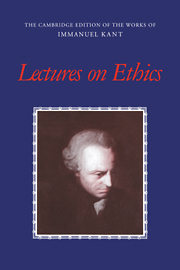Book contents
- Frontmatter
- Contents
- General editors' preface
- Acknowledgments
- Introduction by J. B. Schneewind
- PART I Kant's practical philosophy: Herder's lecture notes (selections)
- PART II Moral Philosophy: Collins's lecture notes
- PART III Morality according to Prof. Kant: Mrongovius's second set of lecture notes (selections)
- PART IV Kant on the metaphysics of morals: Vigilantius's lecture notes
- Select Bibliography
- Explanations of names
- German-English glossary
- English-German glossary
- Name index
- Subject index
PART III - Morality according to Prof. Kant: Mrongovius's second set of lecture notes (selections)
Published online by Cambridge University Press: 05 May 2013
- Frontmatter
- Contents
- General editors' preface
- Acknowledgments
- Introduction by J. B. Schneewind
- PART I Kant's practical philosophy: Herder's lecture notes (selections)
- PART II Moral Philosophy: Collins's lecture notes
- PART III Morality according to Prof. Kant: Mrongovius's second set of lecture notes (selections)
- PART IV Kant on the metaphysics of morals: Vigilantius's lecture notes
- Select Bibliography
- Explanations of names
- German-English glossary
- English-German glossary
- Name index
- Subject index
Summary
Introduction
The faculty of knowledge, the feeling of pleasure and displeasure, and the faculty of desire, are the three powers of the human soul. In all three, understanding and sense can come into play. If understanding is present, then the following sciences are possible: “1” logic, in regard to the understanding; “2” aesthetic, the feeling of pleasure and displeasure in the understanding, which is taste; “3” practical philosophy, the faculty of desire in relation to the understanding. A man has taste, who so chooses, that his pleasure is universal to us, and can be universally communicated. So in feeling, we must therefore consider whether it be capable of universal communication “the understanding addresses the universal, and is therefore in play here”. In all these sciences, the question is: Can anything be known a priori there? With the feeling of pleasure, etc., we get no-where, for there it is a matter of how I am affected. But we can have cognitions and acts of will a priori, in regard to certain objects. There is no a priori science of taste. What things are to our taste can assuredly not be known a priori. A knowledge of objects a priori is possible, and the science thereof is metaphysics. Our will is free, and hence we may conceive of a priori laws that determine the will. The a priori laws that determine the free will are those of morality.
- Type
- Chapter
- Information
- Lectures on Ethics , pp. 223 - 248Publisher: Cambridge University PressPrint publication year: 1997



